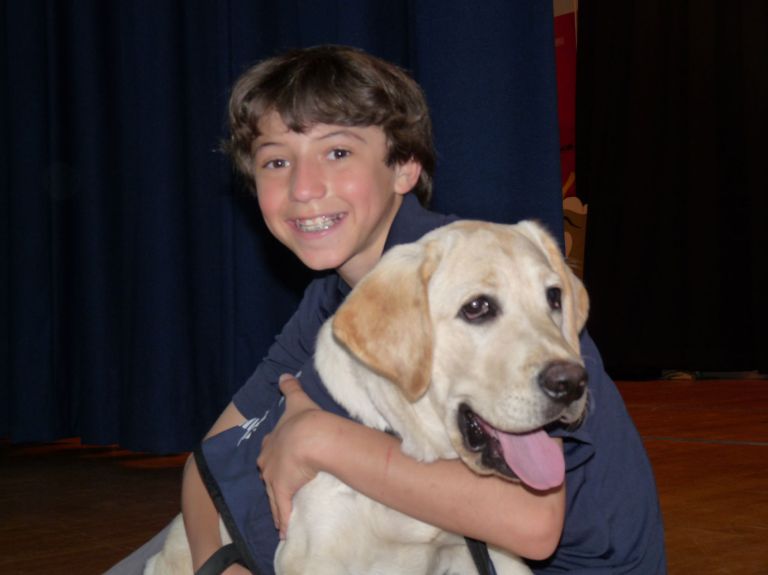
Saying goodbye to the puppies they had raised for the past three months was bittersweet for Ben Fineman and Ben Hakim.
On one hand, they had to let go of the dogs they’d learned to love. On the other, they knew the puppies would eventually become an invaluable partner as a guide dog to somebody living in Israel.
“The most challenging part was to give the dogs away, when you had to go to the airport and watch them go through security,” Hakim said. “I was very emotional, and I was crying.”
From John F. Kennedy Airport, where the Bens said goodbye on Sunday, the puppies travelled to Israel with the senior class at the Schechter School of Long Island, the next chapter in their journey to eventually train at the Israel Guide Dog Center for the Blind, the nation’s only center to train guide dogs.
“This is the most selfless lesson that a 12 year old can possibly learn, plus his siblings, that there are thing you do in life that are absolutely not for yourself,” said Cindy Dolgin, Schechter’s head of school in Williston Park.
Fineman, of Plainview, and Hakim, of Merrick, raised the dogs, which were donated by Guiding Eyes of New York, as their bar mitzvah community service projects.
The boys — with more than a little help from their families, Hakim’s dad said — were charged with teaching the puppies a number of basic Hebrew commands to prepare them for their more advanced training later on.
“We taught them in Hebrew: sit (shev), down (artza), come (elee), stay (hishaair), stand up, right (yemina) or left (smolla),” Fineman said. “We had to teach them some basic commands because we couldn’t teach them every single command.”
“They wanted us to really achieve a couple of things: One was to socialize the puppy…We tried to take the puppy everywhere we went,” said Ben Hakim’s father, Albert. “In terms of classic training, our instructions were to keep her off the furniture, try to get her to go potty outside.”
The potty training, Ben Hakim said, was particularly challenging at first.
“You had to get to get them to go to the bathroom on command (bizzy-bizzy), and getting them to do the actions was very hard,” he said.
Other commands the dogs needed to learn were heel (ragli), forward (kadima), to your place (l’makom), go faster (hap-hap), slowly (le-at) and, of course, no (lo).
Eventually, Ben Hakim said, the dogs will be trained in “smart disobedience.”
For example, a guide dog will stop at a busy intersection with oncoming cars even if instructed by its owner to walk.
The Hakims’ dog, Dottie, more than doubled in weight during her stay with the family, Albert Hakim said. He dubbed the purebred yellow Labrador “super dog.”
“When we got her she was about 20 pounds. She left at close to 50 pounds,” he said. “These are gorgeous yellow labs that are bred to have the right temperament” to be guide dogs.
Ben Fineman’s brother, Max, 14, became the first American to raise a puppy for the Israel Guide Dog Center a couple of years ago, Dolgin said. He also fostered the puppy as his bar mitzvah community service project.
In addition to raising Dottie, Ben Hakim wrote his story on the Israel Guide Dog Center website and helped raise $2,000 for the organization.
“Donations are coming in from all over the world,” Albert Hakim said. “Really, it’s wild.”
The Bens said that sometimes Dottie and the Finemans’ dog, Easton, would play together, and the puppies would test who was the dominant puppy. (“Easton,” Ben Fineman said emphatically.)
“Both of the dogs had little doggy play dates, and we like to say they’re boyfriend and girlfriend because they both love each other,” Fineman said.
Both Bens said they would like to foster other guide-dogs-in-training in the future.
Albert Hakim said the family hopes to stay in contact with Dottie’s future homes in Israel to see her progress through her training.
“And ultimately when we make a visit there…maybe we’ll get an opportunity to see her again,” he said.
He, too, could see himself fostering another puppy.
“I can see myself doing it again,” he said. “I’m hooked.”






